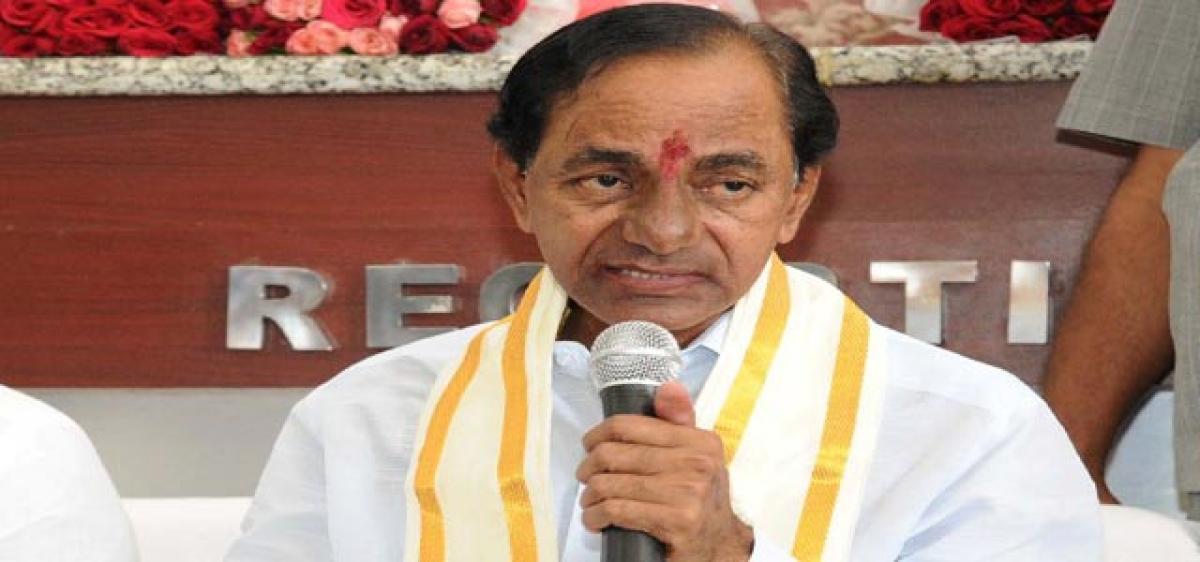Live
- MIXING FRUITS AND CULTURE
- BJP activists elated in Guntur
- Shakira to give her Lamborghini Urus to a lucky fan
- Sheraton Hyderabad Hotel Hosts a Joyful Fruit Mixing Event
- Mastering AI for workplace success
- A Million Lamps
- Eat to live, not live to eat
- Spirituality is extraordinary greed
- Bejan Daruwalla’s horoscope
- ICC’s arrest warrants call for accountability
Just In

I was surprised to receive a call on my mobile from Chief Minister K Chandrasekhar Rao (KCR) himself. He wondered whether I had watched his Cabinet briefing sometime back.
Time 8.30pm; November 28; Monday!
I was surprised to receive a call on my mobile from Chief Minister K Chandrasekhar Rao (KCR) himself. He wondered whether I had watched his Cabinet briefing sometime back. When I replied in the negative, he informed that he had spoken about the debates we had at the Centre for Subaltern Studies (CSS) in 1996-97.
It took me back in time to the days when we discussed about the menace of black money and its impact on the poor at the CSS, a small think tank, set up at Tarnaka in Hyderabad in October 1996. I was amazed by KCR’s strong memory in recalling the informal, but intense talks, on a range of issues, including black money, which was as crucial an issue as it is today.
On December 17, the CM spoke again in the Telangana Legislative Council about the days and debates at CSS on black money. He was replying to a discussion on the hazards of black money and the impact of demonetization in the wake of the scrapping of Rs 1000 and Rs 500 notes on November 8. I was thrilled beyond words. KCR has called on Prime Minister Narendra Modi thrice last month. On each occasion, the CM took a balanced stance on the thorny issue.
Of course, the nature and scope of black money may have acquired a new dimension after demonetization, but the issue was always in the public domain. KCR, as a CM, a Minister, a Legislator, a politician or as a social thinker, has always been aware of its impact on public life.
I will go back to our CSS days. KCR as the Transport minister in the Telugu Desam government in combined Andhra Pradesh supported and sustained the CSS, while I and another fellow- journalist KN Chary looked after its day-to-day running. Basically, the CSS was meant to debate, deliberate and find ways to achieving separate Telangana, which looked formidable at the time.
We had a few rounds of talks in the chambers of KCR at the Secretariat before formally launching the CSS. When we originally wanted to set up a debate forum where a group of like-minded people for Telangana could meet and talk, KCR suggested that issues concerning other marginalized sections of society too be taken up during the brain-storming sessions.
That is how the name Centre for Subaltern Studies was conceived. KCR, though a strong votary of separate Telangana, always believed in fighting against injustice done in all forms of oppression and exploitation– social and economic. We at the CSS conducted seminars and discussions on a range of issues covering all forms of backwardness.
The then Vice-Chancellor of Osmania University Prof Ramakistayya, former High Court judge Justice Sardar Ali Khan, noted human and civil liberties activist KG Kannabiran, former Planning Commission member Ch Hanumanth Rao were among those who visited the CSS. We also gathered papers from leading thinkers like Gail Omvedt, Arun Shourie, Asghar Ali Engineer, Prof FD Vakil, Prof Kanche Ilaiah, BD Sharma, Dr K Balagopal among others, on a range of issues that concerned the combined Andhra Pradesh at the time.
In fact, P Indra Reddy who wanted to start the Telangana movement once visited the CSS to know how we were carrying out our work. Those were the times when the Chandrababu Naidu government was not ready to allow any debate on the backwardness of Telangana. It was the famous refusal of then Assembly Speaker Y Ramakrishnudu to allow a debate on Telangana in the House. Ramakrishnudu announced that he would permit a discussion on the subject, if only the word of Telangana was replaced with “backward areas”.
That incident triggered a severe political backlash. KCR was one of the few leaders in the government who took offensive to the Speaker’s ruling. I think it was during those days that KCR took a solid decision to fight for a separate Telangana. He firmed up his mind even after he was offered the deputy speaker post after the 1999 Assembly elections.
KCR had made open his differences with Chandrababu Naidu on the issue of hike in power tariff in 2000 by writing an open letter to the chief minister on the issue. KCR had meticulously studied the implication of power tariff hike on people of Telangana as their agriculture mostly depends on bore-wells. He was the first from the ruling party to oppose the decision.
That letter was a turning point in KCR’s political career. After that he decisively firmed up the decision to champion the cause of separate Telangana and revive the dormant movement for separate statehood. Many looked at him unbelievably, but he never swerved from his path. After he took a plunge into full-time Telangana politics in 2001, TRS had become another CSS, where debates and discussions were routine.
Even now, KCR appears to be clear on the ways and means of fighting black money. Demonetization is only one of the many ways to remove black money from the economy, but it is definitely not the only way. Ushering in electoral reforms and bringing back black money stashed abroad are the other ways. KCR is the only who can explain this to PM Modi. Having interacted with him, I am sure, he will. (RamaKrishnaSangem.Blogspot.com)
By Rama Krishna Sangem

© 2024 Hyderabad Media House Limited/The Hans India. All rights reserved. Powered by hocalwire.com







